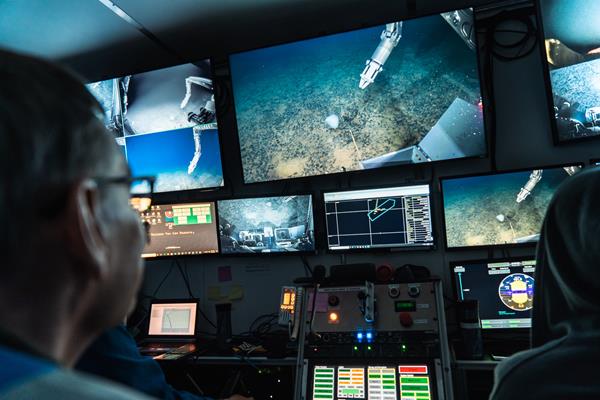
Since 2012, the Company has collaborated with leading industry experts and independent scientists from marine research institutions from around the world on its ESIA, gathering data throughout 22 offshore campaigns.
TMC the metals company Inc. (Nasdaq: TMC) (“TMC” or the “Company”), an explorer of the world’s largest estimated undeveloped source of critical battery metals, today announced that its subsidiary NORI has made a second submission of key environmental data from all prior environmental baseline campaigns conducted in the NORI-D exploration area up to January 2022 to DeepData, an open database of contractor data managed by the International Seabed Authority (ISA).
The submission of this massive batch of data, which includes analysis of an extensive set of geochemical and biological samples from across the water column, follows NORI’s decade-long research efforts to define the polymetallic nodule resource and develop an environmental baseline for its NORI-D exploration area, as part of its Environmental and Social Impact Assessment (ESIA) for the NORI-D Nodule Project. Since 2012, the Company has collaborated with leading industry experts and independent scientists from marine research institutions from around the world on its ESIA, gathering data throughout 22 offshore campaigns.
Dr Michael Clarke, Environmental Manager at The Metals Company, said: “This accumulation of baseline data over the last decade represents the most comprehensive dataset ever collected in the CCZ. When combined and compared with the wealth of data gathered during our 2022 test mining and post-disturbance monitoring campaigns, we believe preliminary analysis is demonstrating that much of the conjecture around environmental impacts of nodule collection is not supported by the science. We are looking forward to submitting the Environmental Impact Statement to the ISA and publishing the dozens of academic papers that will result from this work. When this information becomes available, I am confident that objective stakeholders will clearly see that deep-sea nodule collection is a far less impactful way to source critical metals than mining on land.”

This year’s ISA data submission highlights include:
- Over 12,000 seafloor images from Remotely Operated Vehicle (ROV) operations, leading to:
- Annotation and identification of over 30,000 megafauna and xenophyophores occurrences by the UK National Oceanography Centre.
- More than 2,000 gelatinous nekton identified by JAMSTEC from high-definition ROV video transects conducted from surface to seafloor.
- Data from over 50 deployments of MOCNESS nets, yielding:
- Almost 3,000 samples of pelagic biota (micronekton).
- World-first samples from depths exceeding 4,000 meters.
- Extensive zooplankton samples from 1,500 meters to characterize zooplankton communities.
- Three-year data collection from oceanographic moorings providing insights into particulate organic carbon flux in the Eastern CCZ.
Over the coming months, NORI will continue working with research teams to fully collate and categorize the hundreds of terabytes of data and thousands of biological samples that have been collected to date. NORI expects numerous further papers to be published in peer-reviewed journals in the coming months and years, adding significantly to society’s understanding of the deep sea.
Since the late 1960s, over 300 hundred offshore campaigns have been conducted in international waters, with over $2 billion invested in environmental baseline and impact studies and technology development, with most of the capital invested by private companies. To address knowledge gaps, governments and contractors like NORI have spent over 9,000 days – the equivalent of almost 25 years – at sea, assessing the deep-sea environment, research and investment which has accelerated significantly since the establishment of the ISA’s exploration regime.
About The Metals Company
The Metals Company is an explorer of lower-impact battery metals from seafloor polymetallic nodules, on a dual mission: (1) supply metals for the global energy transition with the least possible negative impacts on planet and people and (2) trace, recover and recycle the metals we supply to help create a metals commons that can be used in perpetuity. The Company through its subsidiaries holds exploration and commercial rights to three polymetallic nodule contract areas in the Clarion Clipperton Zone of the Pacific Ocean regulated by the International Seabed Authority and sponsored by the governments of Nauru, Kiribati and the Kingdom of Tonga.
